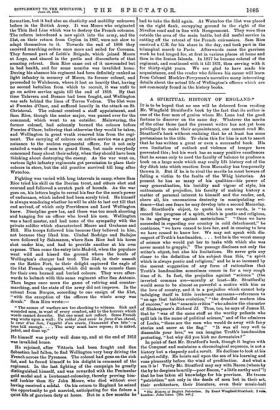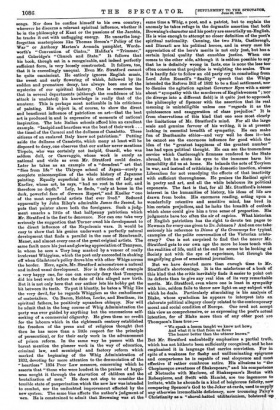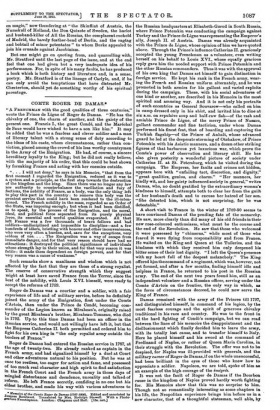A SPIRITUAL HISTORY OF ENGLAND.*
IT is to be hoped that no one will be deterred from reading Mr. Wingfield Stratford's book by the fact that its author is one of the four men of genius whom Mr. Lane had the good fortune to discover on the same day. Whatever the merits of the other three (and the present writer has not yet been privileged to make their acquaintance), one cannot read Mr. Stratford's book without realizing that he at least has some pretensions to the title. To claim this for him is not to assert that he has written a great or even a successful book. His own limitation of outlook and violence of temper have prevented this; but his work has so many positive excellences that he seems only to need the faculty of balance to produce a book on a large scale which may really lift history out of the dry ditch into which reaction from Macaulay has temporarily thrown it. But if be is to rival the merits be must beware of falling a victim to the faults of the Whig historian. At present he has so many of his qualities—his power of easy generalization, his lucidity and vigour of style, his enthusiasm of prejudice, his faculty of making history a matter of personal interest to himself and the reader, and, above all, his unconscious dexterity in manipulating evi- dence—that one fears he may develop into a second Macaulay. Mr. Stratford's object, to quote his own words, is " to record the progress of a spirit, which is poetic and religious, in its agelong war against materialism." " Once we have succeeded in regarding our country in cold detachment," he continues, " we have ceased to love her, and in ceasing to love we have ceased to know her. We may not speak with dis- respect of Truth's handmaiden, . . . but he is the worst enemy of science who would put her to tasks with which she was never meant to grapple," The passage discloses not only the writer's object, but also his limitations. He never gets any closer to the definition of his subject than this, "a spirit which is always poetic and religious," and he is so incensed by the merest suggestion of any form of rationalism that Truth's handmaiden sometimes comes in for a very rough time of it. In fact, the prejudice against "science" (the inverted commas are—morally at least—Mr. Stratford's) would seem to be almost as powerful a motive with him as the love of country, and it is a prejudice which cannot help indulging itself in little irrelevant sarcasms—references to " an age that babbles evolution," " the dreadful modern idea of success," or the " anaemic critics " who admire the character of Shakespeare's Richard II. Thus, too, he says of James II. that he " was of the same stuff as the worthy pedants who spill ink in the name of political science," and of the admirers of Locke, "these are the men who would do away with fairy stories and sneer at the flag." " It was all very well to dissemble your love," we can imagine Truth's handmaiden protesting, " but why did you kick me downstairs " In point of fact Mr. Stratford's book, though it begins with the Conquest and maintains a chronological sequence, is not a history but a rhapsody and a revolt. He declines to look at his subject coldly. He hoists sail upon the sea of his learning and runs pleasantly before the wind of predilection. And what a sea it ia! Verily Mr. Stratford may say with Bacon (whom by the by he despises heartily—poor Bacon, " a little earthy soul "!) that he has taken all knowledge for his province. He traces "patriotism" not only in the deeds of men but in their art, their architecture, their literature, even their music-hall • The History of English Patriotism, By Esm6 Wingfield Stratford.. 2 rob. London : John Lane. [25s. net.] songs. Nor does he confine himself to his own country ; wherever he discerns a relevant spiritual influence, whether it be in the philosophy of Kant or the passions of the Jacobin, he tracks it out with unflagging energy. He unearths long- forgotten masterpieces like Thomas Becon's " Policy of the War" or Anthony Marten's Armada pamphlet, Words- worth's "Convention of Cintra," Halifax's "Trimmer," and Coleridge's "Church and State." It follows that his book, though set in a recognizable, and indeed perfectly sufficient form, is very loosely constructed. It follows, too, that it is exceedingly unequal. Even Mr. Stratford cannot be quite omniscient. He entirely ignores English music, the sweet and early flowering of which, followed by its sudden and premature decay, has always been one of the mysteries of our spiritual history. One is conscious too that in several departments (although the confidence of his attack is unabated) his knowledge is really that of the amateur. This is perhaps most noticeable in his criticisms of painting. His object is, of course, to show the direct and beneficent influence of patriotism on art—that the best art is produced in and is expressive of moments of national inspiration. The late Italian schools afford him an excellent example. "Insipid and heartless was the best of their work ... the tinsel of the Caracci and the dullness of Canaletto. These citizens of an enslaved Italy knew not patriotism." Putting aside the dullness of Canaletto, which many at least will be disposed to deny, one observes that our author never mentions Tiepolo, who was certainly not insipid, Guardi, who was seldom dull, or Caravaggio, whose work is surely as national and virile as even Mr. Stratford could desire. Later he takes as an example of a " decadent " art that "flies from life" the Ukiyoye school of Japan—surely a complete misconception of the whole history of Japanese painting. Equally superficial is his criticism of Lely and Kneller, whose art, he says, " had no root in the soil, and therefore no depth." Lely, he finds, " only at home in the dark, powerful face of German Rupert," and Kneller "one of the most superficial artists that ever lived." Seduced apparently by John Riley's admirable James the Second, he puts that painter above both the foreigners. Such a judg- ment smacks a little of that halfpenny patriotism which Mr. Stratford is the first to denounce. Nor can one take very seriously the suggestion that Turner owed his development to the direct influence of the Napoleonic wars. It would be easy to show that his genius underwent a perfectly natural development that finds a parallel in the case of Rembrandt, Manet, and almost every one of the great original artists. The same fault mars his just and glowing appreciation of Tennyson, in whom he sees a Tory long masked by a veneer of really irrelevant Whiggism, which the poet only succeeded in shaking off when Gladstone's policy drove him with other Whigs across the border. Here, again, Mr. Stratford misconstrues a natural and indeed usual development. Nor is the choice of example a very happy one, for one can scarcely deny that Tennyson did his best work before the date of this alleged new birth. But it is not only here that our author lets his hobby get the bit between its teeth. To put it bluntly, he hates a Whig like the very devil, for he regards Whiggism as the embodiment of materialism. On Bacon, Hobbes, Locke, and Bentham, its spiritual fathers, he positively squanders obloquy. Nor will he admit that in the long course of Whig Administration the party was ever guided by anything but the unconscious self- seeking of a commercial oligarchy. He gives them no credit for the labours which in the eighteenth century established the freedom of the press and of religious thought (but then he has more than a little respect for the principle of persecution), or for their early work in the advancement of prison reform. In the same way he passes with the barest mention the pioneer work in the way of education, criminal law, and municipal and factory reform which marked the beginning of the Whig Administration of 1832, devoting far more attention to the denunciation of the " heartless " 1834 Poor Law measure, concerning which he asserts that "those who were loudest in the praises of happi- ness sought it through the starvation of children and the brutalization of men." He does not stop to consider the terrible state of pauperization which the new law was intended to combat, nor the undoubted improvement effected by the new system. The same bias affects the author's judgment of
• neia. He is constrained tc admit that Browning was at the
same time a Whig, a poet, and a patriot, but to explain the anomaly he takes refuge in the dogmatic assertion that both Browning's character and his poetry are essentially un-English. He is wise enough to attempt no closer definition of the poet's spiritual nationality. Canning, the two Pitts, Castlereagh, and Disraeli are his political heroes, and in every case his appreciation of the hero's merits is not only just, but has a certain lyrical quality that ennobles justice. When one comes to the other side, although it is seldom possible to say that he is definitely wrong in facts, one is none the less too often conscious that prejudice is weighting the scales. Thus it is hardly fair to follow an old party cry in concluding from Lord John Russell's " finality " speech that the Whigs intended the Reform Bill of 1832 to be a final settlement, nor to dismiss the agitation against Governor Eyre with a sneer about " sympathy with the murderers of Englishwomen " ; nor (to diverge into a different field) is it quite just to approach the philosophy of Spencer with the assertion that its real meaning is unintelligible unless one "regards it as the quintessence and exaggeration of class prejudice." It is from observations of this kind that one sees most clearly the limitations of Mr. Stratford's mind. For all the large scale and genuine fervour of his writing, it is at present lacking in essential breadth of sympathy. He can make fun of Benthamite ethics—and very well he does it—but he cannot see the enormous influence for good which the idea of the " greatest happiness of the greatest number" has had upon political thought. He can see the tremendous service which Castlereagb's firmness rendered to the State abroad, but be shuts his eyes to the immense harm his immobility did us at home. He belauds the acts of Toryism in war, and instead of criticizing its domestic inaction, abuses Liberalism for not remedying the effects of that inactivity with sufficient thoroughness. He praises the Radical spirit in poetry and art, and all the while belabours its political exponents. The fact is that, for all Mr. Stratford's intense interest in the humanities of history, his ideas of life are drawn from books. His enormous reading, acting upon a wonderfully retentive and sensitive mind, has bred in him certain prejudices, and he lacks the breadth of outlook which alone could give him a true sense of proportion. His judgments have too often the air of caprice. What historian of English patriotism has the right to devote ten pages to Newman for every one given to Dr. Johnson ? And can one take seriously his reference to Diana of the Crossways for typical examples of the polite conversation of the Victorian aristo- cracy ? One is not surprised to find that the nearer Mr. Stratford gets to our own age the more be loses touch with the realities of life, until at the end he seems to be looking at Society not with the eye of experience, but through the magnifying glass of sensational journalism.
But we have devoted more than enough time to Mr. Stratford's shortcomings. It is the misfortune of a book of this kind that the critic inevitably finds it easier to point out its defects than to give any real idea of its very remarkable merits. Mr. Stratford, even where one is least in sympathy with him, seldom fails to throw new light on any subject with which he deals. Particularly stimulating is his analysis of Blake, whose symbolism he appears to interpret into an elaborate political allegory closely related to the contemporary moral and social condition of Europe. One need not accept this view as comprehensive, or as expressing the poet's actual intention, for of Blake more than of any other poet are Thompson's lines true :-
" We speak a lesson taught we know not how;
And what it is that from us flows The bearer better than the utterer knows."
But Mr. Stratford undoubtedly emphasizes a partial truth, which has not hitherto been sufficiently recognized, and he has emphasized it in language that carries conviction. For in spite of a weakness for flashy and unilluminating epigrams and comparisons he is capable of real eloquence and most effective if rather cumbrous satire. His allusions to "the Chopinesque sweetness of Shakespeare," and his comparisons of Nietzsche with Marlowe, of Shakespeare's Brutus with Robespierre, and Swift with Hamlet, are too ingenuous to irritate, while he abounds in a kind of boisterous felicity, now comparing Spencer's God to the Joker at cards, used to supply any otherwise irremediable deficiency, now trouncing Paley's Christianity as a " shovel-hatted utilitarianism, bolstered up
on magic," now thundering at " the Skinflint of Austria, the Numskull of Holland, the Don Quixote of Sweden, the harlot and husband-killer of All the Russias, the complacent cuckold of Madrid, the bawdy feather-head of Berlin, and the ragtag and bobtail of minor potentates " to whom Burke appealed to join his crusade against Jacobinism.
But one might go on quoting from, and quarrelling with, Mr. Stratford until the last page of the issue, and at the end feel that one had given but a very inadequate idea of his performance. For, in spite of his many faults, he has produced a book which is both history and literature and, in a sense, poetry. Mr. Stratford is of the lineage of Carlyle, and, if he can only avoid the temptations that have distracted Mr. Chesterton, should yet do something worthy of his spiritual parentage.




























































 Previous page
Previous page